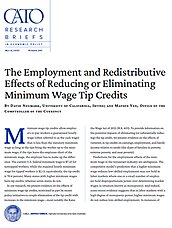Minimum wage tip credits allow employers to pay workers a guaranteed hourly wage (often referred to as the cash wage) that is less than the statutory minimum wage as long as the tips bring the worker up to the minimum wage; if the tips leave the employee short of the minimum wage, the employer has to make up the difference. The current U.S. federal minimum wage is $7.25 for nontipped workers, while the required hourly minimum wage for tipped workers is $2.13; equivalently, the tip credit is 70.6 percent. Many states with higher minimum wages have tip credits, whereas seven states do not.
In our research, we present evidence on the effects of minimum wage tip credits, motivated in part by recent policy initiatives to couple elimination of the tip credit with increases in the minimum wage—most notably the Raise the Wage Act of 2021 (H.R. 603). To provide information on the potential impacts of eliminating (or substantially reducing) the tip credit, we present evidence on the effects of variation in tip credits on earnings, employment, and family income relative to needs (the share of families in poverty, extreme poverty, and near poverty).
Predictions for the employment effects of the minimum wage in the restaurant industry are ambiguous. The competitive model’s prediction that a higher minimum wage reduces low-skilled employment may not hold in labor markets where one or a small number of employers hold disproportionate power over determining market wages (a situation known as monopsony). And indeed, some recent evidence suggests that in labor markets with a high degree of monopsony power, higher minimum wages do not reduce low-skilled employment. In instances of monopsony, a rise in the minimum wage can theoretically even lead to increases in employment. The monopsony model may be particularly relevant in the restaurant sector. For example, some previous research has relied on models of the restaurant industry where workers receive both a cash wage and tips. Since tips are shared among workers in this model, the average tip increases with a lower number of workers in a restaurant. Thus, to hire more workers, a restaurant must offset the decline in average tip income caused by adding more workers by increasing wages paid to all existing employees. In this instance, an increase in the minimum wage can theoretically lead to an increase in employment to a certain point, but an increase in the minimum wage above that point will eventually lead to decreased employment.
We find some evidence that smaller tip credits, equivalent to higher-tipped minimum wages, increase earnings of tipped restaurant workers, although the evidence is not strong. We also find evidence of negative effects on employment. Overall, we find that the effect on total earnings is negative (although often indistinguishable from zero). This evidence suggests that tipped restaurant workers do not gain, on average, from increases in the tipped minimum wage and may even lose income.
We then compare the effects of raising the minimum wage and eliminating tip credits on different income groups and households. We simulate the potential redistributive effects of minimum wages first by only considering the impacts of statutory raises alone, without considering behavioral responses of individuals. To do this, we compare the distribution of the family income-to-needs ratio among tipped workers earning less than the statutory minimum wage with the distribution among other low-wage workers. We also compare the potential redistributive effects of eliminating the tip credit in the federal minimum wage with a broad increase in the federal minimum wage that raises the total wages—or wage bill—paid to workers by the same amount while leaving the tip credit intact.
We find that restaurant workers earning tipped wages in states where the federal minimum wage impacts the wages in that state are in families that are either in similar positions as or slightly higher in the income-to-needs distribution than other low-wage workers in those same states. Reflecting this, when we compare two simulated policy changes—eliminating the tip credit in the federal minimum wage and then raising the tipped minimum wage to the federal minimum wage—with a comparable general minimum wage increase that raises the wage bill the same amount while preserving the tipped minimum wage, the latter policy has the advantage of raising earnings for more workers and is better targeted toward reaching more poor and low-income families.
The second component is an analysis of the impact of the tipped minimum wage on the probability of being extremely poor, typically poor, or nearly poor. Consistent with the evidence from the earnings and employment analysis, as well as the simulation analysis, we find that neither eliminating the tipped minimum wage nor increasing it is likely to deliver redistributional benefits. However, some of these conclusions are more fragile with respect to whether we focus on more recent data only or use a longer sample period; the latter evidence, which does not point to distributional benefits of higher tipped minimum wages, is more robust and reliable.
NOTE
This research brief is based on David Neumark and Maysen Yen, “The Employment and Redistributive Effects of Reducing or Eliminating Minimum Wage Tip Credits,” NBER Working Paper no. 29213, September 2021, http://www.nber.org/papers/w29213.

This work is licensed under a Creative Commons Attribution-NonCommercial-ShareAlike 4.0 International License.
